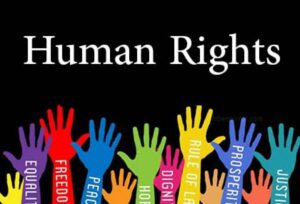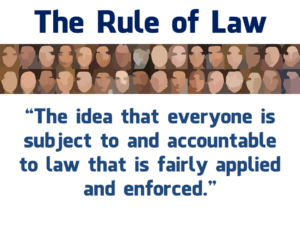Back to: Religion and National Value JSS2
Welcome to class!
In today’s class, we’re going to be talking about Protection of Human Rights and the Rule of Law. I trust you will enjoy the class!
Protection of Human Rights and the Rule of Law

Human rights are universal entitlements inherent to all individuals by virtue of their humanity. They are inalienable and indivisible, encompassing civil, political, economic, social, and cultural rights.
Rule of Law: The principle that all individuals and institutions, including the government, are subject to and accountable to the law. It implies equality before the law, fairness, and the absence of arbitrary power.
II. Religious Foundations of Human Rights

The concept that humans are created in God’s image, endowing them with inherent dignity and worth.
The principle of treating others as you would like to be treated.
Emphasis on caring for the poor, marginalized, and oppressed. Traditional African Religions:
Emphasis on the well-being of the community and respect for elders.
Harmony: Strive for balance and harmony in relationships with others and the natural world.
Morality: Upholding values of honesty, integrity, and respect for life.
III. The Rule of Law in Nigeria

The Constitution: The 1999 Nigerian Constitution (as amended) is the supreme law of the land, enshrining fundamental human rights in Chapter IV.
Legal Framework: Nigeria has ratified various international human rights treaties and conventions, such as the Universal Declaration of Human Rights and the African Charter on Human and Peoples’ Rights.
IV. Promoting Human Rights and the Rule of Law in Nigeria
Education: Integrate human rights education into school curricula, emphasizing religious and cultural perspectives.
Civic Engagement: Encourage citizens to be active participants in the democratic process and hold leaders accountable.
Interfaith Dialogue: Foster understanding and cooperation between different religious groups.
Legal Reforms: Strengthen the judiciary and law enforcement agencies to ensure fair and impartial application of the law.
Media: Utilize the media to raise awareness about human rights issues and promote a culture of respect for the rule of law.
We have come to the end of today’s class. I hope you enjoyed the class!
In the next class, we shall be discussing consumer rights and responsibilities.
In case you require further assistance or have any questions, feel free to ask in the comment section below, and trust us to respond as soon as possible. Cheers!
Conclusion
- Individual Responsibility: Emphasize the role of each individual in upholding human rights and respecting the rule of law.
- Collective Effort: Building a just and equitable society requires the collective efforts of citizens, religious leaders, government officials, and civil society organizations.
- The Promise of Nigeria: A nation that upholds human rights and the rule of law can realize its full potential, ensuring peace, prosperity, and dignity for all its citizens.
Question Time:
- How do the concepts of human rights and the rule of law intersect, and why are they essential for a just and equitable society like Nigeria?
